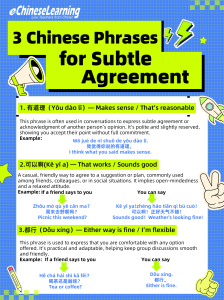Yǒu dàolǐ
有道理
Makes sense / That’s reasonable
This phrase is often used in conversations to express subtle agreement or acknowledgment of another person’s opinion. It’s polite and slightly reserved, showing you accept their point without full commitment.
Example:
Wǒ juéde nǐ shuō de yǒu dàolǐ.
我觉得你说的有道理。
I think what you said makes sense.
Kěyǐ a
可以啊
That works / Sounds good
A casual, friendly way to agree to a suggestion or plan, commonly used among friends, colleagues, or in social situations. It implies open-mindedness and a relaxed attitude.
Example:
Zhōu mò qù yě cān ma?
周末去野餐吗?
Picnic this weekend?
Kě yǐ ya!zhèng hǎo tiān qì bú cuò!
可以啊!正好天气不错!
Sounds good!Weather’s looking fine!
Dōu xíng
都行
Either way is fine / I’m flexible
This phrase is used to express that you are comfortable with any option offered. It’s practical and adaptable, helping keep group discussions smooth and friendly.
Example:
Hē chá hái shì kā fēi?
喝茶还是咖啡?
Tea or coffee?
Dōu xíng.
都行。
Either is fine.
Want to sound more like a native?Sign up for a free 1-on-1 Chinese trial lesson!




